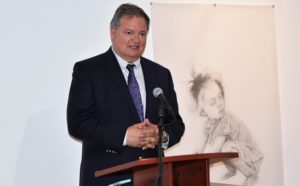Business can do more to help economic reconciliation

By Kelly Anne Smith
NORTH BAY— At the WKP Kennedy Gallery’s podium, Leo DeLoyde rolled out a new study confirming our area Indigenous population contributes over $260 million in economic output per year.
DeLoyde is with the North Bay Indigenous Friendship Centre’s (NBIFC) Urban Aboriginal Strategy (UAS) and Reconciliation North Bay. He calls the study’s findings significant in making the case for inclusion.
In attendance from the UAS Community Action Team were Donna Forget of True Self-Debwewendizwin and Urban Aboriginal Strategy Coordinator Alex DeGagne.
DeLoyde says Reconciliation North Bay is taking the Truth and Reconciliation work to heart and focusing on cultural training and making community connections. He adds there is a new conversation about reconciliation.
The Chair of Reconciliation North Bay is Dr. Mike DeGagné, the President of Nipissing University. He also served on the Interim Board of Directors for the National Council for Reconciliation. DeGagné points to the 8,085 Indigenous people in our community for making a wonderful contribution economically, socially, politically, and culturally.
Reconciliation North Bay recognized Medical Officer of Health Dr. Jim Chirico of the North Bay Parry Sound District Health Unit and Paul Heinrich, President and CEO of the North Bay Regional Health Centre for their “amazing efforts toward reconciliation.”
Chirico said there is a new path forward building relationships.
“It’s time to open hearts and minds to do things differently.”
Heinrich explained the hospital’s mobilized health care team supports northern communities.
The Reconciliation North Bay report was rolled out as part of Learning Together: National Indigenous People’s Day. The evening included a juried NBIFC Indigenous Art Exhibition reception and the showing of Reconciliation on Bay St., a film written by Maurice Switzer. The film was a well-attended Chamber of Commerce After-Hours event.
The Vice-President of the Board of the NBIFC, Maurice Switzer of Alderville First Nation, helped establish Reconciliation North Bay.
Switzer wrote Reconciliation on Bay St. as a response to the Truth and Reconciliation Commission’s final report— especially Call to Action #92. Centering on better business relations, it calls for training for all levels of business on intercultural competency, conflict resolution, human rights, and anti-racism.
The film looks for a shift from corporations so that success for Indigenous Peoples becomes the norm. Switzer reasons for business to become familiar with Call to Action #92 and to do more to help the Indigenous population.
Back to the North Bay Indigenous Centre’s report on North Bay’s economic and demographic prospects for Indigenous and non-Indigenous residents 2016-2041, there are many positive findings.
Leo DeLoyde says the study shows the Indigenous population growing to 12%, which is about triple parts of southern Ontario.
The Indigenous population is growing faster than the non-Indigenous, especially for those aged 20 years and younger. Future fertility rates will be higher for Indigenous Peoples in the region.
In the area, the Indigenous residents of Nipissing First Nation have the highest percentage of post-secondary levels of education at 58.9%.
The study shows an increase of future jobs in health, education, and other services will offset the predicted decline in primary (producing raw materials to process) and manufacturing jobs.
Overall employment is expected to rise slightly. Through to 2041, the Indigenous population will account for an increasing share of the area’s labour market.
Positive news continues with a recent study stirring optimistic headlines that finds three-quarters of Indigenous youth envision reconciliation taking place within their lifetimes.


